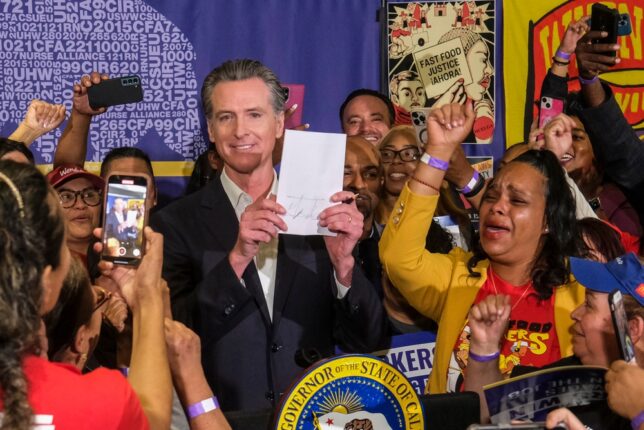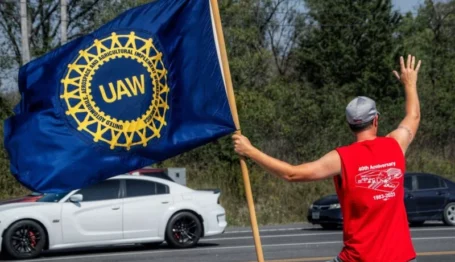Labor Watch
A Curious Carveout in Big Labor’s Golden State
 Gov. Gavin Newsom signs the fast food bill AB1228 on September 28, 2023, setting $20/hour as the minimum wage for fast food workers. Credit: Ringo Chiu. License: Shutterstock.
Gov. Gavin Newsom signs the fast food bill AB1228 on September 28, 2023, setting $20/hour as the minimum wage for fast food workers. Credit: Ringo Chiu. License: Shutterstock.

Last week, it emerged that California’s fast-food minimum wage law, which was enacted to avoid a ballot-measure fight over its sectoral-bargaining law demanded by the influential Service Employees International Union (SEIU), had a loophole that seemed suspiciously closely designed to exempt Panera Bread. And a major Panera franchisee is close to Gov. Gavin Newsom (D). For the record, Newsom and the SEIU deny there is such a carveout, and Panera agreed to pay the fast-food minimum wage.
But the brief brouhaha should teach conservatives important lessons about both labor policy and the realities of union politics. Namely, those politics are about institutional power and protecting Big Labor’s liberal friends, not necessarily the interests of working people.
Sectoral Bargaining, Revisited
In 2022, California—at the urging of the Service Employees International Union, which is exceptionally influential in Big Labor’s Golden State—enacted legislation essentially bringing sectoral bargaining to the quick-service restaurant industry. To remind the reader what sectoral bargaining is, we wrote at the time:
In sectoral bargaining, unions negotiate with the government and industrywide associations of employers on contracts that apply to everyone, not just union members. As a result, French collective-bargaining contract coverage is nearly universal. Most other Continental countries have some form of sectoral bargaining as well.
Restaurant industry associations responded by petitioning for a ballot measure to reverse the legislation. This was a big gamble with high stakes, as many small-business franchise owners considered the destructive regulations California’s (likely union-dominated) regulatory board might hand down to be an existential threat to their livelihoods. But minimum wage hikes are popular, since the negative consequences of minimum wage hikes tend to emerge only after their enactment, while the politician’s promise of higher pay is right there in the bill title. (These hikes are the classic “ice cream” policy that looks great at the time but may have negative consequences in the future.)
If the measure failed, all the regulations the SEIU desired could be enacted with the imprimatur of the public will, consequences aside. Rather than risk it, the restaurant owners took a deal with the union, state legislature, and Gov. Newsom in 2023. The powers of the sectoral bargaining board would be curtailed to essentially advisory in exchange for a $20 hourly base minimum wage indexed to inflation.
Freshly Baked Legalized Graft?
But it emerged that the deal included a curious item: Bloomberg News reported that “chains that bake bread and sell it as a standalone item” were exempt from the law and subject to the state’s $16 per hour general minimum wage. And there was an even curiouser coincidence: Greg Flynn, a Panera Bread franchisee and critic of the original sectoral bargaining legislation, is a friend and political ally of Gov. Newsom. Flynn gave at least $73,200 to Newsom’s gubernatorial campaigns and $100,000 to oppose a 2021 recall effort.
How convenient. For the record, Newsom, and the SEIU deny that Panera is in fact exempted from the fast-food wage rule, and the company has since agreed that it will pay the fast-food minimum. But the negative consequences of the fast-food regulations and wage levels demanded by the SEIU are already coming to pass, with Pizza Hut making layoffs and McDonald’s and Chipotle announcing price hikes.
The Lesson
It’s easy to make this a story about California being ridiculous and Gov. Newsom being corrupt in the legally acceptable way common to big-government politicians. But there’s another lesson for conservatives at a time when liberal foundations like the Hewlett Foundation and Omidyar Network are funding groups like American Compass to promote sectoral bargaining and other left-wing economic policies: Hold the line, and stick to the eight-decade Taft-Hartley consensus that opposes compulsory unionism like sectoral bargaining.
Labor unions—which have aligned with the Left for more than a century—and their political allies aren’t engaging in weighing the best policies for workers. They’re engaged in coalitional mutual backscratching, and conservatives aren’t part of that coalition. There is no reason to believe, especially under the prevailing left-of-center ideology of Everything Leftism, that labor unions will ever consider conservatives worthy of joining that coalition on conditions of other than abject surrender to the full spectrum of leftist policy, no matter how much conservative activists supplicate for liberal foundation money or supplicate for union bosses’ support. As I’ve noted before, patronage is as old as the Republic, and institutional liberalism, of which Big Labor is a cornerstone, has always been very good at it.



